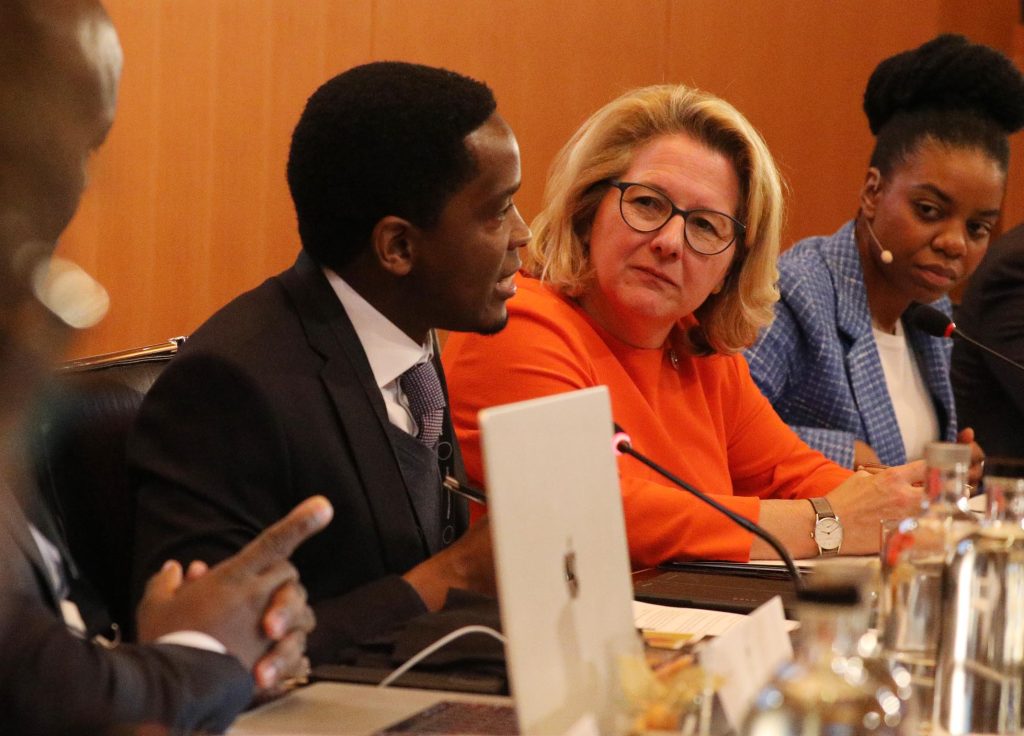Result-oriented, fact-based, continuous
Encounter, Knowledge, Communication
We promote global responsibility and multilateral cooperation by networking key actors and leaders from Africa and Europe at our high-level events. Results and policy recommendations are prepared through studies and strategy papers while we are in continuous exchange with our network. Thus, we ensure that the dialogue has a lasting impact on political discourse. Our focus areas are business and global health as well as pressing political topics. In doing so, we also include the intersecting topics climate, advancement of women and digital matters in our program.
Encounter
The personal exchange always comes first: It paves the way for a trusting conversation, a result-oriented dialogue, and sustainable relationships. Our curated gatherings aim to build strong networks to jointly address the global challenges of our time. This is how we shape the African-European cooperation of the future.
Knowledge
The exchange of knowledge and the publication of policy papers and studies are crucial for the development cooperation of the future. They provide a solid basis of information, promote the exchange of experience and facilitate evidence-based decisions. Only in this way can we develop effective strategies for future cooperation between Europe and Africa and consciously act as a competent partner.
Communication
In an ongoing dialogue, we allow the stakeholders of African-European cooperation to speak publicly and invite them to share their perspectives. In this way, we create awareness for the pressing issues of our time and enable broader participation and transparency for the development cooperation of the future.
Program
Investments in women's health are threatened by budget cuts and anti-gender movements. In our webinar, we discussed innovative strategies to drive progress in our digital dialogue.
The inequalities in the global health system have a significant impact on the financial situation of women. We discussed economic growth through equal opportunities.
Together with David Miliband, CEO & President of IRC, and selected stakeholders from politics, business, academia, we discussed Germany's responsibilities in an international system in crisis.
In conversation with Anna Bjerde and other representatives from politics, business, and academia, we discussed efforts in fostering sustainable development.
The African continent has the potential to become the global agriculture powerhouse. The action recommendations of the sixth conference.
The research paper on new technologies and innovation in the African agricultural sector was issued on the occasion of The Africa Roundtable “Growing Africa's Future” 2024 in Berlin.
The research paper on food sovereignity in Africa was issued on the occasion of The Africa Roundtable “Growing Africa's Future” 2024 in Berlin.
Together with Bill Gates, Annegret Kramp-Karrenbauer, and other representatives from politics, business and academia, we discussed Germany's new role in the world.
Forests play a vital role in local economies and global climate protection. In our webinar, we explored how economic growth and environmental protection go hand in hand.
Curated Gatherings
Conference
The high-level format provides a stage for experiences and expertise, whose international appeal has a significant impact on the political dialogue. In close cooperation with our partner organizations, we gather different spheres around one shared topic.
Salon
Continuous dialogue creates awareness for the urgent questions of our time. In salons, renowned experts open the discussion with our curated guests from business, politics and society.
Circle
We believe in proximity building trust. Our most personal format therefore offers the opportunity to deepen the knowledge of our high-ranking guests in a small circle, together with an exchange of experiences, in dialogue.
Politics Briefing
Politics Briefing foster professional dialogue with policymakers. This format is aimed particularly at members of the Bundestag, but also at political actors in government, ministries or political foundations.
Bilateral Meeting
With strong networks, the global challenges of the European and African continents can be tackled together. That is why we network opinion leaders from both continents, bringing together those who belong together.





































